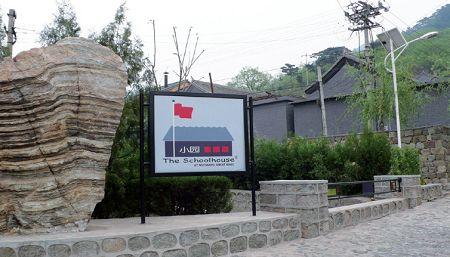|
|
|
The Schoolhouse at Mutianyu. (Photo: Globaltimes.cn) |
BEIJING, May 19 -- On an early summer rainy afternoon, James Spear, an American entrepreneur and architect, sits at The Schoolhouse, his renovated country retreat and business at the Great Wall, working on sustainable tourism and planning a slow food harvest celebration with local villagers.
"Slow food is aimed at preserving an organic and natural approach to food, involving people in production and consumption in different ways and you think about what you eat, where it came from, so you enjoy the food slowly," Spear told the Global Times.
First arriving in Beijing 24 years ago to study Chinese at Peking University, Spear's life changed when he met a T-shirt seller on the Great Wall in 1994.
"He wanted me to buy a T-shirt from him, I really didn't want to buy a T-shirt, but I told him I thought it was very beautiful here," Spear explained. "As a foreigner, I had always dreamed to have a house on the Great Wall, but I didn't think that would ever come to be. This person I had never met before, he told me 'I'll help you,' and he did. His name is Li Fengquan, he now lives three doors down from me, in Mutianyu village."
Spear took a 30-year lease on a dilapidated property in Mutianyu. He converted the house into a weekend retreat and now, it is his home.
"Donkeys making noises in the morning, chickens making noises, people talking with each other, it is not all just like a picture, it's a real village with real people," Spear explained.
Since his humble Mutianyu beginnings, Spear has since worked on 23 renovated properties in the area and co-owns and operates The Schoolhouse and The Brickyard Inn, two sustainable tourism concepts in Mutianyu.
He has always held close the concept of locally-sourced goods and services and together with people who he and his partners have introduced into the local area, has invested 70 million yuan ($10 million) locally.
The upcoming slow food event at The Schoolhouse is a celebration of such local cooperation.
As the harvest event of the year and jointly hosted by the Slow Food Beijing Convivium, Slow Food Saturday on September 4 will offer visitors a day to enjoy the local area and connect with local farmers who contribute their produce.
Apart from tasting local ingredients, the day promises to be filled with demonstrations, hands-on farming and local entertainment, as well as hiking and biking around the region.
"We see our enterprise as one part of the local community," Spear said. "To be sustainable, first you have to respect people, second, you need to operate legally and ethically and third, you have to provide our customers with high quality service and pleasant experiences."
While Spear and business partner, Liang Tang, also his wife of 28 years and their teenage daughters Lauren and Emily, enjoy the life they have established in Mutianyu, it wasn't always easy for the lone American in the village.
Spear recalled early protests of his neighbors, demanding he not park his car outside his own property and each night destroying the paved road that he would build during the day.
Eventually, both families went to the village hall and with the support of the local mayor, Spear ended up leasing his neighbor's orchard.
"I have tremendous respect for these people; many of them work very hard during their whole lives, with good humor and generosity, a kind of decent sharing," he added.
Local plumbers, gardeners, chefs and waiters are all part of Spear and his partners' sustainable local tourism concept in place at both businesses, with the team also utilizing local produce and helping villagers develop home stays and rent their properties to visitors.
Local villagers have also been integral to Spear's success, as at the beginning, he learnt traditional building methods from his neighbors and many helped him plan, construct and realize his dreams. "Since I was a little boy, I like designing things; I always have had passion for design, for trying to create order and beauty in my life," Spear said.
Originally working in China for a medical equipment firm, the opportunities of the small village of Mutianyu have allowed Spear to sustainably renovate each old house instead of starting anew and have lent him to give his properties distinctive and romantic names: Grandma's House, Eagle's Rest, Red Door and Stone Forest.
"The architecture, the environment is about space, it is not about walls, not about roads, I can imagine space, views and I like doing different things," Spear explained.
The Schoolhouse itself was renovated from a broken down village school and now offers lodging, a Western restaurant, art glass classes, recreation activities and breathtaking terrace views of the Great Wall.
Equipped with modern facilities, the Schoolhouse and its associated lodgings aim at providing a certain level of comfort and luxury while staying in the local rural community, with the lure of the Great Wall, blue sky and fresh air.
"It is so amazing, it is contemporary and traditional, does not spoil the area and respects the environment," commented Jeanette Artini, a traveler from South Australia, after visiting one of the renovated houses.
For those wanting to follow in Spear's footsteps, he has some words of advice: "A lot of times people come from outside into a community, they think if they have money, they can just buy anything they want, it is not so simple. If you just come and put money in front, you clearly don't respect the people. It is very hard to communicate then."






